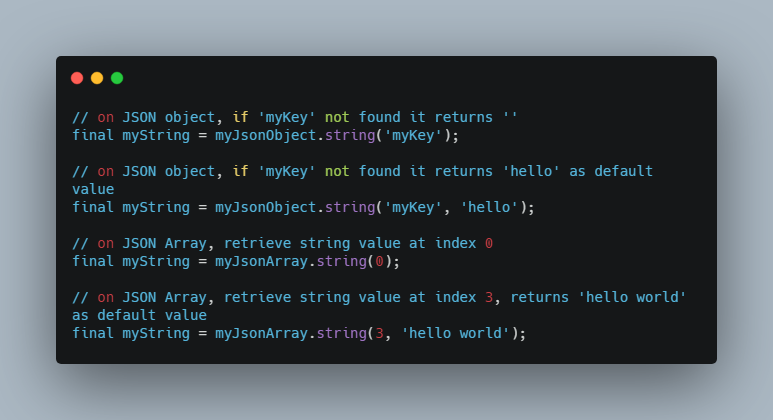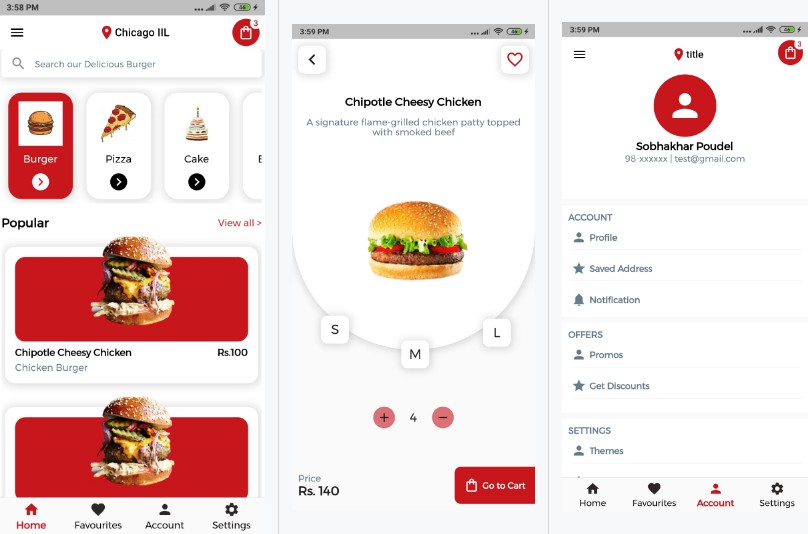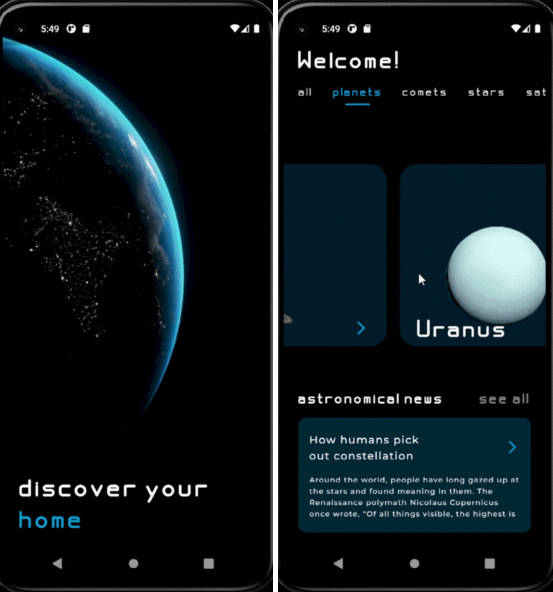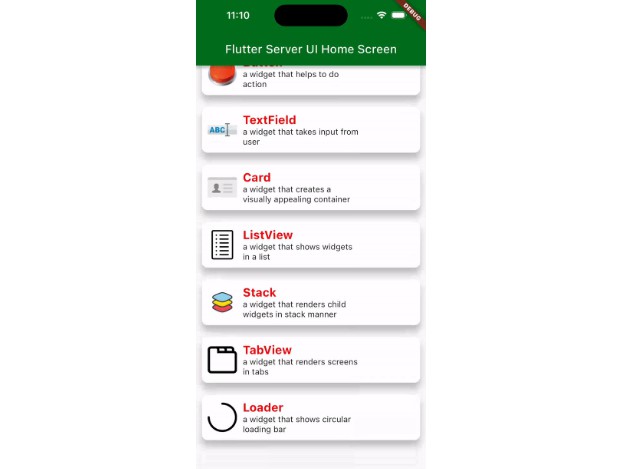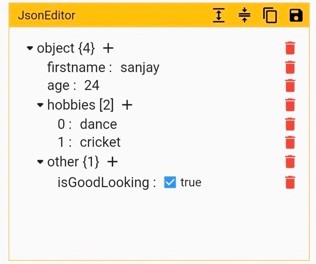Lazy JSON
Provides null-safety implementation to simplify JSON data handling by adding extension method to JSON object and JSON array.
Getting started
Add dependency in pubspec.yml
dependencies:
lazy_json: ^1.0.2
Usage
Import library to your .dart file:
import 'package:lazy_json/lazy_json.dart';
Supported Data Types
String
String type has default value ” (empty string)
Usage:
// on JSON object, if 'myKey' not found it returns ''
final myString = myJsonObject.string('myKey');
// on JSON object, if 'myKey' not found it returns 'hello' as default value
final myString = myJsonObject.string('myKey', 'hello');
// on JSON Array, retrieve string value at index 0
final myString = myJsonArray.string(0);
// on JSON Array, retrieve string value at index 3, returns 'hello world' as default value
final myString = myJsonArray.string(3, 'hello world');
Integer
int type has default value 0 (zero)
Usage:
// on JSON object, if 'myKey' not found it returns 0
final myInteger = myJsonObject.integer('myKey');
// on JSON object, if 'myKey' not found it returns 99 as default value
final myInteger = myJsonObject.integer('myKey', 99);
// on JSON Array, retrieve integer value at index 0
final myInteger = myJsonArray.integer(0);
// on JSON Array, retrieve integer value at index 3, returns 100 as default value
final myInteger = myJsonArray.integer(3, 100);
Float / Double
double type has default value 0.0 (zero)
Usage:
// on JSON object, if 'myKey' not found it returns 0.0
final myFloat = myJsonObject.float('myKey');
// on JSON object, if 'myKey' not found it returns 99.9 as default value
final myFloat = myJsonObject.float('myKey', 99.9);
// on JSON Array, retrieve float/double value at index 0
final myFloat = myJsonArray.float(0);
// on JSON Array, retrieve float/double value at index 3, returns 100.89 as default value
final myFloat = myJsonArray.float(3, 100.89);
Boolean
bool type has default value false
Usage:
// on JSON object, if 'myKey' not found it returns false
final myBoolean = myJsonObject.boolean('myKey');
// on JSON object, if 'myKey' not found it returns true as default value
final myBoolean = myJsonObject.boolean('myKey', true);
// on JSON Array, retrieve boolean value at index 0
final myBoolean = myJsonArray.boolean(0);
// on JSON Array, retrieve double value at index 3, returns true as default value
final myBoolean = myJsonArray.boolean(3, true);
JSON Object
Map<String, dynamic> type has default value {} (empty object)
Usage:
// on JSON object, if 'myKey' not found it returns empty object
final myObject = myJsonObject.integer('myKey');
// on JSON object, if 'myKey' not found it returns JSON object {'a' : 10}
final myObject = myJsonObject.integer('myKey', {'a' : 10});
// on JSON Array, retrieve JSON object at index 0
final myObject = myJsonArray.integer(0);
// on JSON Array, retrieve JSON object at index 3, returns {'b' : 'hello world'} as default value
final myObject = myJsonArray.integer(3, {'b' : 'hello world'});
JSON Array
List<dynamic> type has default value [] (empty array)
Usage:
// on JSON array, if 'myKey' not found it returns empty array
final myArray = myJsonObject.array('myKey');
// on JSON object, if 'myKey' not found it returns JSON array ['a', 'b']
final myArray = myJsonObject.array('myKey', ['a', 'b']);
// on JSON Array, retrieve JSON array at index 0
final myArray = myJsonArray.array(0);
// on JSON Array, retrieve JSON array at index 3, returns [100, 200, {'b' : 'hello'}] as default value
final myArray = myJsonArray.array(3, [100, 200, {'b' : 'hello'}]);
Shorthands Methods
Even lazier, all shorthand methods are basically regular methods with first letter only
myJsonObject.s('myKey'); // shorthand for myJsonObject.string('myKey');
myJsonObject.i('myKey'); // shorthand for myJsonObject.integer('myKey');
myJsonObject.f('myKey'); // shorthand for myJsonObject.float('myKey');
myJsonObject.b('myKey'); // shorthand for myJsonObject.boolean('myKey');
myJsonObject.o('myKey'); // shorthand for myJsonObject.object('myKey');
myJsonObject.a('myKey'); // shorthand for myJsonObject.array('myKey');
myJsonArray.s(1); // shorthand for myJsonArray.string(1);
myJsonArray.i(2); // shorthand for myJsonArray.integer(2);
myJsonArray.f(3); // shorthand for myJsonArray.float(3);
myJsonArray.b(4); // shorthand for myJsonArray.boolean(4);
myJsonArray.o(5); // shorthand for myJsonArray.object(5);
myJsonArray.a(6); // shorthand for myJsonArray.array(6);
